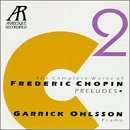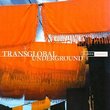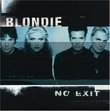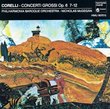| All Artists: Frederic Chopin, Garrick Ohlsson Title: Garrick Ohlsson: The Complete Chopin Piano Works Vol. 2 - Preludes Members Wishing: 1 Total Copies: 0 Label: Arabesque Recordings Release Date: 9/29/1992 Album Type: Import Genre: Classical Styles: Chamber Music, Historical Periods, Classical (c.1770-1830) Number of Discs: 1 SwapaCD Credits: 1 UPC: 026724662928 |
Search - Frederic Chopin, Garrick Ohlsson :: Garrick Ohlsson: The Complete Chopin Piano Works Vol. 2 - Preludes
 | Frederic Chopin, Garrick Ohlsson Garrick Ohlsson: The Complete Chopin Piano Works Vol. 2 - Preludes Genre: Classical
|
Larger Image |
CD DetailsSimilarly Requested CDs
|
CD ReviewsGENTEEL PRELUDES Melvyn M. Sobel | Freeport (Long Island), New York | 01/02/2002 (3 out of 5 stars) "Beautiful playing by Ohlsson: smooth and even, well within the parameters of acceptability, guaranteed to please... but not excite the senses, nor ruffle any emotional or psychological feathers. And therein lies the dilemma. In my auditing traversal of Arabesque's twelve volume Chopin series, I grew used to Mr. Ohlsson's penchant for risk-taking, for delineating hidden voices and melodies, for boldly and passionately stating the most unique musical positions relative to Chopin's compositions. That's why, although "beautifully" played, these Op. 28 Preludes seem to me just a tad too low key, too cautious and weak on characterization, and almost homogenous--- adjectives I would never ordinarily use to describe the multi-talented Ohlsson. One need only listen to his phenomenal performances of Chopin's Scherzi, Nocturnes or Mazurkas, as mere examples, to know that these renditions of the Preludes must be anomalous. In his book, CHOPIN: THE MAN AND HIS MUSIC (published in 1900), James Huneker refers to the Preludes as "moods in miniature." Would this were so, here. Unfortunately, another setback, for me, is the exclusion on this disc of the Prelude in C-Sharp Minor, Op. 45, which, in the majority of recordings today, along with the Prelude in A-Flat, Op. Posth., always follows the twenty-four preludes of Op. 28. (The Op. 45 may be found in Volume 8--- Masterpieces and Miniatures--- of this series. And the rationale for its absence from Volume 2, here, is not explained in Frank Cooper's usually well-documented liner notes, either.) Anyway, the loss of the gorgeous Op. 45 Prelude--- played so sensitively by Mr. Ohlsson elsewhere--- may seem a trivial concern, but it really does compromise the integrity--- the aesthetic "wholeness"--- of one's conception of a set purported to be the "complete" Preludes. So, as hesitant as I am to say it, and as fond as I am of Mr. Ohlsson's Chopin interpretations, I must confess to being a little more than disappointed here. However, later volumes in this series more than make up for this lackluster issue and DO present the artist at full emotional scope and throttle. The Rondos, Opp. 1 and 5, which conclude this CD, demonstrate aptly the Ohlsson-to-come: a pianist who can take these tripping, ticklish morsels and spin them into fascinating filigrees with the most excellent finesse. It seems rather anticlimactic to say, but Mr. Ohlsson is supported by an excellent sound: warm, rich, focused. Ah, well. [Running time: 63:11]" This may be a recording you either love or hate. Melvyn M. Sobel | 03/22/1999 (2 out of 5 stars) "I bought this CD based on its one 5-star review and was very disappointed. I suppose it depends on whose recordings you're used to listening to, but after many years of hearing Moravec's Preludes, I find Ohlsson's unbearable. The slow preludes are way too slow and the fast ones sound like he's in a race to beat every other rendition. The volume is also a problem with many parts either too soft or too loud. Judging by the previous review, some listeners will like the recording - but certainly not all will. I definitely do not." (-) Celestially Beautiful 2nd Volume Remake C. Pontus T. | SE/Asia | 10/11/2008 (5 out of 5 stars) "Having just praised Ohlsson's first 1974 EMI Preludes rendition (luckily available in a bargain twofer together with the excellent 1977-9 Nocturnes--Chopin: Préludes & Nocturnes), this 1989 Arabesque remake is in fact even finer. The main differences concern pacing, rubato and tone colour; in these areas Ohlsson attains a level of sophistication that is unsurpassed on disc. However, I've indeed added a tiny minus due to some occasional lack of fire and risk-taking.
Melvyn M. Sobel finds the Op 28 Preludes 'a tad too low key' in comparison with other installments in Ohlsson's complete cycle. In the C major, G major, F-sharp minor and E-flat major, I do have to agree with him. Nonetheless, labeling the whole disc a 'lackluster issue' couldn't be more inaccurate, considering the time-stopping E minor, F-sharp major, D-flat major, A-flat major, C minor and B-flat major Preludes--as well as the more than sufficiently passionate C-sharp minor, E-flat minor, B-flat minor, F minor and D minor Preludes. By the way, his Op post A-flat major is unsurpassed in its pure exquisiteness. (The fact that the Op 45 C-sharp minor Prelude is included in the eighth volume [Garrick Ohlsson - The Complete Chopin Piano Works Vol. 8 ~ Masterpieces & Miniatures] certainly shouldn't distract anyone from this issue--not least since having no relation but the somewhat arbitrary title with the 24 Preludes 'proper'.) Consequently, Ohlsson's main strength lies within the more introspective numbers, where he is unique in revealing the celestial beauty inherent in Chopin's writing. For the utmost fire and passion, there is Argerich; for the most individually rendered perfection, there is Pogorelich. Again, Arabesque gives Ohlsson the most excellently captured Bösendorfer sound possible. The concluding Opp 1 & 5 Rondos create the bridge to the succeeding third installment (Garrick Ohlsson - The Complete Chopin Piano Works Vol. 3 - Ballades), containing the Ballades and the Opp 16 & 73 Rondos. Although the case can be made that Ohlsson raises the Rondos to a higher level of maturity than any other pianist (cf. the First Sonata Finale: Garrick Ohlsson - The Complete Chopin Piano Works Vol. 1 ~ Sonatas), the downside is that the Rondo a la Mazur becomes draggy at 9:58 (cf. Ashkenazy's glittering 7:28). Hence, further motivation for the minus." |

 Track Listings (28) - Disc #1
Track Listings (28) - Disc #1




